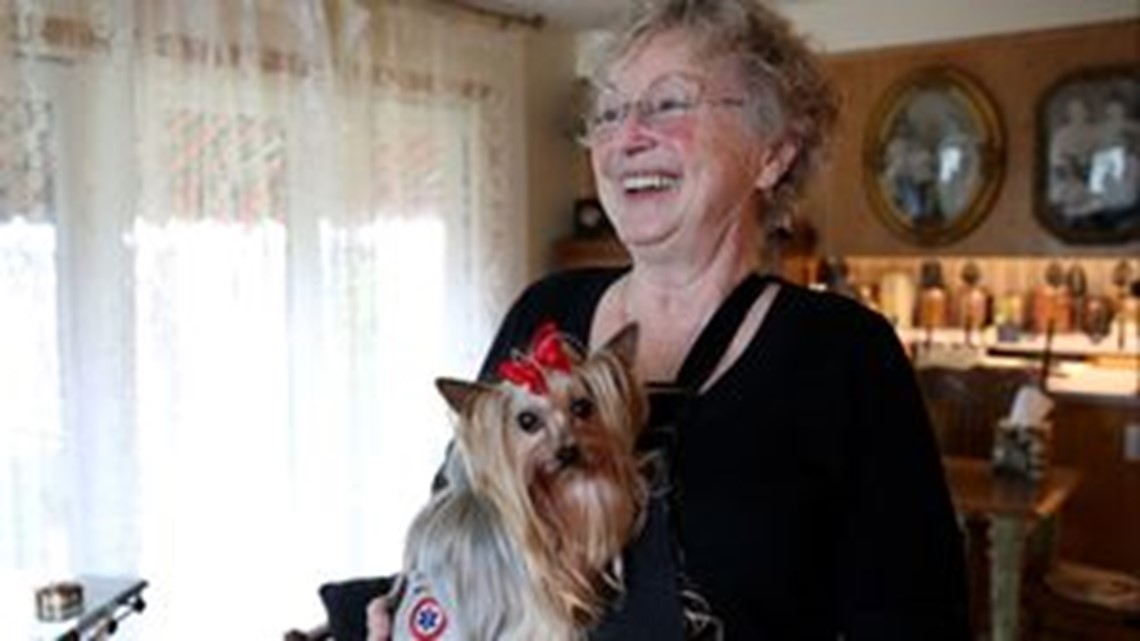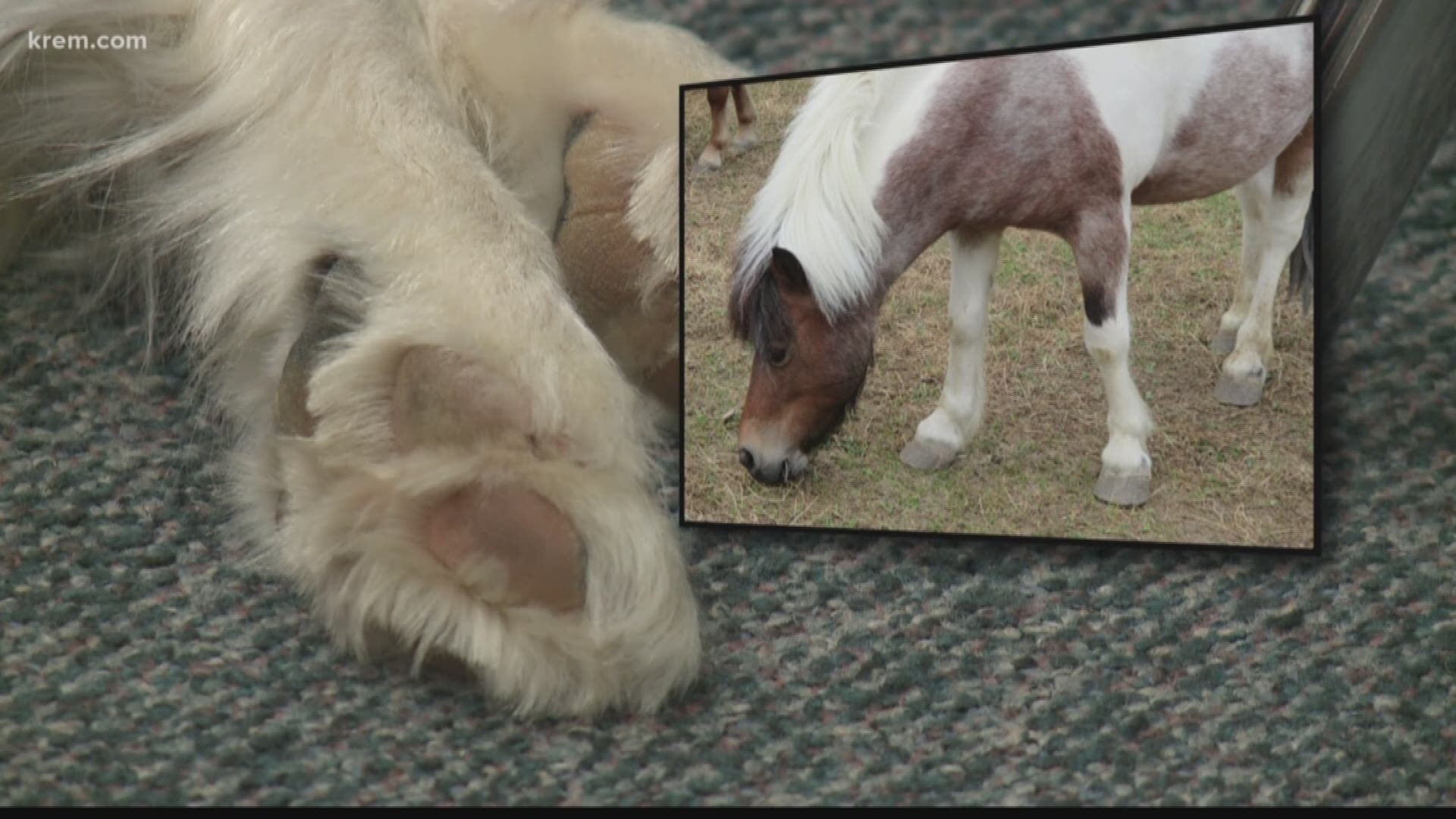Fiona is a super dog, if you ask Eleanor Miller.
The Yorkshire terrier has saved her life more times than she can count, alerting the 77-year-old to impending chest pain and signaling her to take her medication.
Eleanor suffers from coronary artery disease, the leading cause of death in the U.S. for both men and women. The arteries that supply blood to the heart become hardened and narrowed; the most common symptom is chest pain, also known as angina.
If left untreated, angina can lead to a heart attack, irregular heart rhythms, or heart failure, all life-threatening conditions.
At the first sign of an episode, Fiona jumps to action
When Fiona senses an angina episode coming on, first she whimpers, then she paws at Eleanor’s chest.
“I would never be without her unless I was at the hospital and my heart was connected to wires,” said Eleanor, a resident at Lancaster Village in Northeast Salem.
The small but mighty Yorkie doesn’t wear a cape, although her blue and gold coat flows like one. She tips the scale at a smidge under 4 pounds.
She wears a vest with a registered service animal patch, travels in a comfy black sling held close to Eleanor’s chest, and has superpowers no one can fully explain.
“We don’t know how she does it,” Eleanor said. “The important thing is she does.”
Eleanor never planned on getting another dog, but then came a phone call that may have ultimately saved two lives.
A breeder she worked with previously was going out of business and had one dog left who didn’t want to have anything to do with anyone — until she met Eleanor.
“When I came in, she ran right to me,” Eleanor said.
Fiona stole her heart that day and has been protecting it ever since.


'The nurse was convinced my dog knew what was happening'
Eleanor was diagnosed with coronary heart disease in December 2005, about four years before she brought Fiona home.
It wasn't long before the pup made her presence known.
When Eleanor went to the hospital with heart attack symptoms, she had scratch marks and a bloodied chest. It happened a second time, with more scratch marks and blood.
Nurses wondered if she was a victim of domestic violence.
She told them her dog did it, and she had no idea why. During the second hospital visit, a nurse suggested she get Fiona trained as a service dog.
“The nurse was convinced my dog knew what was happening,” said Eleanor, who both times had angioplasty procedures to open blocked arteries. Stents were placed in her lateral anterior descending artery and her obtuse marginal artery.
Fiona's journey to becoming an official service dog
Eleanor spoke to her doctor, who wrote a letter saying he had determined she “would greatly benefit from a service dog due to medical concerns" and that it would be a long-term need.
Fiona did her training in Portland alongside Labrador retrievers and German shepherds, graduating in April 2011.
A service animal, according to the American Disabilities Act, is an animal which is trained to do a task or service directly related to a disability. Oregon state law also uses the term “assistance animal.”
Service or assistance animals are generally allowed to accompany their owners wherever the public can go. Animals that provide only emotional support, comfort or companionship aren't service animals and do not have the same protections.
But because there is no official certification process or official national registry of legitimate service dogs, the privilege can be abused.
Some people print phony certificates and ID cards or buy service animal vests online that legitimate service dogs usually wear, passing their pets off as the real thing to gain access to restaurants and stores.
The vests may help fake service dogs gain entry, but their behavior often gives them away.
“I’ve seen so-called service dogs pee on (store items) and poop in aisles,” Eleanor said.
Businesses have little recourse. The law allows them to ask those entering with animals just two questions: Is that a service dog? What is it trained to do for you?
Twenty-two states criminalize some aspect of service animal fraud, including 19 with true bans on the fraudulent representation of pets as service animals, according to the latest research by the Animal Legal & Historical Center at Michigan State University.
Oregon is not one of them.
'She knows her job'
Eleanor doesn't have to worry about how Fiona behaves in public, whether it’s at church, in a theater, or at a restaurant.
“She never even sniffs the food,” Eleanor said. “She stays focused.”
When inside the home, Fiona seldom takes her eyes off Eleanor. When visitors arrive she's extra vigilant, even when out of her pouch for a stretch.
“She knows her job and will do her best to ignore you,” Eleanor said. “She’s an example of what all service dogs should be like.”


Medical alert dogs are a specialized subset of service dogs, able to warn people of oncoming seizures, strokes, even heart attacks. It can take hundreds of hours of professional training to teach a dog to detect drops in blood pressure, blood sugar, or other changes in body chemistry.
For some dogs, though, detecting those minute changes seems to be inherent.
“It’s not that unusual, especially if you’ve got a bond with your dog,” said Suzanne Brean, founder and head trainer for Dogs for Invisible Disabilities, a nonprofit in Lebanon. “We had a dog in our group a couple years ago who would alert its partner when she was getting ready to have strokes. The dog would know when her blood pressure got high.”
Science hasn’t determined how some dogs can do this without training. Some, like Brean, believe it’s a sense of smell.
“You smell different when you’re sick, when your body chemistry changes,” Brean said. “They have a hell of a lot better nose than us.”
Others believe it may be the dog’s hearing or its ability to recall a sequence of events.
“Generally, what happens is the dog doesn’t like when an owner has an episode — whether it’s diabetic, a seizure, whatever — it upsets them,” said Joy St. Peter, founder and director of The Joys of Living Assistance Dogs, a nonprofit in Salem. “They learn the changes in the body and what comes before an episode.”
Neither local organization trains medical alert dogs, which can involve collecting scent samples during the medical episode for which an alert is desired. If interested in locating an organization that does such training, St. Peter recommends visiting the Assistance Dogs International website.
17 alerts in one month
In Fiona's case, she may smell something different or sense changes in blood flow or heart rhythm before Eleanor feels chest pain.
The 8-year-old Yorkie alerts Eleanor a couple times a month. A year ago, during a particularly stressful time for Eleanor, Fiona was credited with 17 alerts in one month.
Eleanor uses a prescribed nitroglycerin spray, which shortens or even prevents attacks of angina. It corrects the imbalance between the flow of blood and oxygen to the heart by dilating the arteries and veins and decreasing the amount of work for the heart.
The tiny bottle, about the size of nail polish, is always close by in the pouch with Fiona.
Relief usually comes a few minutes after Eleanor administers a spray under her tongue.
Fiona is a pampered pup with a reputation to uphold in the neighborhood.
She has a standing appointment with a groomer every Wednesday, always leaving with a red satin ribbon on top of her head.
New residents at Lancaster Village are in awe when they hear tales of her heroics. Clerks at a nearby Fred Meyer, where Eleanor shops, adore her.
“They don’t know my name," Eleanor said, "but they know hers."
“Forward This” highlights the people, places, and organizations of the Mid-Willamette Valley. Contact Capi Lynn at clynn@StatesmanJournal.com or 503-399-6710, or follow her the rest of the week on Twitter @CapiLynn and Facebook @CapiLynnSJ.

